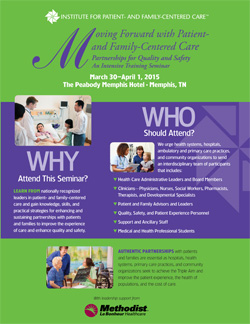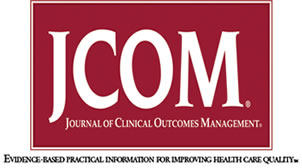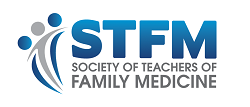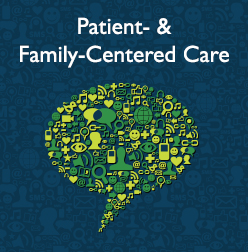IPFCC’s Spring Seminar in Memphis ~ Early Bird Registration Rate Through February 6, 2015
|
|
 With leadership support from Methodist Le Bonheur Healthcare, IPFCC’s Moving Forward with Patient- and Family-Centered Care: Partnerships for Quality and Safety ~ An Intensive Training Seminar, will be held in Memphis, TN, March 30-April 1, 2015. With leadership support from Methodist Le Bonheur Healthcare, IPFCC’s Moving Forward with Patient- and Family-Centered Care: Partnerships for Quality and Safety ~ An Intensive Training Seminar, will be held in Memphis, TN, March 30-April 1, 2015.
This Semi nar provides education for administrative leaders, board members, physicians, nurses and other staff, patients, and families to collaborate effectively to advance the practice of patient- and family-centered care and build partnerships with patients and families to transform health care. Past participants have described this seminar as “life changing.”
Watch the video reflections of a team from Vermont that attended the 2014 fall seminar. nar provides education for administrative leaders, board members, physicians, nurses and other staff, patients, and families to collaborate effectively to advance the practice of patient- and family-centered care and build partnerships with patients and families to transform health care. Past participants have described this seminar as “life changing.”
Watch the video reflections of a team from Vermont that attended the 2014 fall seminar.
What Makes This Seminar So Unique?
- Faculty team of over 20 experts in patient- and family-centered care—administrative leaders, nurses, physicians, staff, and patient and family leaders.
- Faculty review of pre-seminar personal learning goals.
- Three days of intensive training including over 50 sessions to tailor the program to meet your specific needs and interests.
- Faculty-led small group discussion time each day and assistance in creating an effective Action Plan for change individualized for your organization.
- Flash drive containing over 200 practical tools—a comprehensive collection of resources for use in strategic planning; presentations, orientation, other educational sessions; and evaluation.
In responding to opportunities created by health care reform in the United States and the visionary recommendations of the Josiah Macy Jr. Foundation’s 2014 report, Partnering with Patients, Families, and Communities: An Urgent Imperative for Health Care, IPFCC has created a special one-day track for residents and fellows to participate in the IPFCC seminar. This track for trainees will focus on building skills to engage in respectful, mutually beneficial partnerships with patients and families at all levels of care and with others across disciplines on the health care team. The emphasis of the day will be on strategies to incorporate patient- and family-centered care into day-to-day practice both in the hospital and in the outpatient setting.
Continuing education credits are available.
A tour of Le Bonheur Children's Hospital will be offered Tuesday, March 31, 3:30 - 5:30 pm. Space is limited; registration required.
Learn more about the seminar. Download the Brochure.
The Peabody Memphis Hotel is holding a limited number of hotel rooms at a special group rate until February 26, 2015. To make your hotel reservations, call (800) 732-2639 or go to the hotel’s reservation site.
Register today. Take advantage of the early bird registration rate through February 6, 2015!
|
|
IPFCC Seminar “Kick Starts” University of Vermont Medical Center PFCC Journey
|
|

According to Anna Noonan, RN, Vice President, Jeffords Institute for Quality, University of Vermont Medical Center, “The [IPFCC Cambridge] seminar inspired us to move from the “to and for” to partnering “with” our patients and families as we journey forward…. we have done [much] since attending [the] seminar and we know we still have a long way to go. We’re encouraged by our progress since November. Yeah team!”
Steps taken to date include:
- Presentation to the Executive Team, leading to adopting PFCC organization-wide;
- Charter of PFCC Steering Committee;
- Hiring patient/family advisor to be PFCC Project Manager;
- Selected date and planning PFCC retreat for February; and
- Development of strategies and implementation plan.
The nine-person team from University of Vermont Medical Center left the IPFCC Cambridge Intensive Training Seminar in early November, all fired up!
Hear reflections from the UVMC team.
|
|
For Pinwheel Sponsors—
Scholarship Opportunity to Attend
IPFCC Seminar in Memphis
|
Is your organization a Pinwheel Sponsor? Are you planning to send a team to the Moving Forward with Patient- and Family-Centered Care ~ Partnerships for Quality and Safety Intensive Training Seminar, to be held in Memphis, TN, March 30-April 1, 2015? If so, your organization is eligible to be considered for a scholarship for an additional team member to attend the seminar. Interested Pinwheel Sponsors submit your organization's name to Ann Selinger by February 18th, to be included in the drawing for one paid seminar registration for an additional participant to attend the seminar.

Pinwheel Sponsor Ann & Robert H. Lurie Children’s Hospital of Chicago, received the scholarship for IPFCC's November Seminar held in Cambridge, MA, giving Eileen Johnson, Manager, Concierge Services, the opportunity to be added to the hospital's team. According to Eileen, her experience attending the seminar “enhanced my knowledge of PFCC and moved me to improve our on-boarding/educational process, daily huddling with staff to integrate PFCC Principles and our Service Principles… the opportunity was truly inspirational and has already shaped a new focus to raise the bar in my role professionally and personally.”
Learn more about the Pinwheel Sponsorship Program, and all the additional benefits.
Early Bird Seminar Rate ends February 6, 2015!
See you in Memphis!
|
|
Changing Hospital Visiting Policies: From Families as “Visitors” to Families as Partners
 The Journal of Clinical Outcomes Management January 2015 Reports From the Field, features IPFCC’s Better Together campaign to change hospital “visiting” policies from families as “visitors” to one of family presence welcoming families as partners in care. The Journal of Clinical Outcomes Management January 2015 Reports From the Field, features IPFCC’s Better Together campaign to change hospital “visiting” policies from families as “visitors” to one of family presence welcoming families as partners in care.
Many hospitals still have “visiting” hours that limit family presence and are not responsive to patient preferences. To change the concept of families as visitors and eliminate restrictive hospital visiting policies, IPFCC launched the campaign Better Together: Partnering With Families, calling on all hospitals to welcome families 24 hours a day and transform their policies and approaches to care so that patients’ families and loved ones are included in care and decision-making according to patient preference.
Read the article, which includes a very personal account of how these policies affected one couple.
Pledge to join the Better Together campaign to change visiting policies from families as “visitors” to families as partners at your hospital.
|
Consumer Reports ~ Being Treated with Respect Increases Odds to Stay Safe in the Hospital
|
|

A December Consumer Reports article, The Surprising Way to Stay Safe in the Hospital ~ Increase Your Odds by Getting Staff to Listen and to Treat You with Respect, links being treated with respect—a core concept of patient- and family-centered care—while a patient is in a hospital with increased patient safety. Patients surveyed who said they rarely received respect from hospital staff were two-and-a-half times as likely to experience a medical error.
The article reports on a survey that measured perceptions. One in four respondents did not feel that they were treated “as adults able to be involved in their own care" or “like a person.” About one-third did not feel listened to without interruption, and did not feel that their wishes were always honored. Many felt they were not always treated fairly and without discrimination.
The article describes examples of respectful behavior such as clinicians not using medical jargon, hospital staff and clinicians introducing themselves before doing anything else, and patients being treated as “capable of making decisions about [their] own care..." Additionally, patients are listened to without being interrupted, their questions are answered, concerns addressed, and wishes "honored whenever possible.” It means that members of the “medical team acknowledge mistakes and recognize [each patient] as … more than …[a diagnosis].”
The author cites statistics linking hospital medical errors to 440,000 deaths annually, and cites the literature that “creating a culture of respect in health care is part of the larger challenge of creating a culture of safety.” The safest hospitals “reveal certain common cultural characteristics: shared core values of transparency, accountability and mutual respect.”
Evidence cited in this article supports the notion that being actively involved in your health care will produce better outcomes, lower costs, and few medical errors. In other words, patient- and family-centered care not only enhances the perceptions of the patient experience, it also may just make your hospital stay safer, cheaper, and healthier!
Download IPFCC's Better Together pocket guide for practical strategies on how to engender dignity and respect while you or a loved one is a patient in the hospital.
|
Patients Teaching Patient Safety
|
In a recent editorial in the BMJ Quality & Safety (previously Quality & Safety in Health Care)*
Drs. Antonia Stang and Brian Wong posit that having “actual patients
tell their stories and interact directly with learners...warrants
consideration for several important reasons,” including:
- Provides an authentic patient perspective;
- Provides an experiential learning experience; and
- Models
patient engagement, providing a very visible example of patients
playing a more active role in health care system redesign and advancing
the training of future health professionals.
Read more about what these authors have to say…
*An
international peer review publication providing research, opinions,
debates and reviews for academics, clinicians, and health care managers
focused on the quality and safety of health care and the science of
improvement.
|
Dying in America: A Constructive Step Forward and an Opportunity to Deepen Partnerships With Patients and Families |
|

On December 9, 2014, the Annals of Internal Medicine published several commentaries touching on the issues raised in the Institute of Medicine’s (IOM) September report, Dying in America: Improving Quality and Honoring Individual Preferences Near the End of Life.
Dying in America: A Constructive Step Forward and an Opportunity to Deepen Partnerships With Patients and Families, written by Debra L. Ness, President of the National Partnership for Women & Families, and Beverley H. Johnson, President and CEO of the Institute for Patient- and Family-Centered Care, argues that “much can be gained by adopting the framework of working with rather than for patients and families.”
While praising the IOM report for much of its content, including its “focus on the clinical care and social support essential to effective palliative and end-of-life care, and the “need for care to be continuously aligned with the values, preferences, and needs of patients and families, which change frequently as illness progresses,” the authors note that the IOM report does not explicitly recognize the “essential concept of partnership” that is at the core of patient- and family-centered care (PFCC).
The commentary discusses three areas from the IOM’s recommendations that could benefit immediately from involvement of patients and families as partners:
- Quality Improvement efforts on palliative and end-of-life-care in primary care practices;
- The “design, development, teaching, and evaluation of interdisciplinary educational programs for palliative and hospice care;” and
- Research and accountability for end-of-life care.
Read More…
|
IOM Report on Forging Effective Partnerships |
In this December 2014 Institute of Medicine (IOM) discussion
paper, Patients and Health Care Team Forging Effective Partnerships, the authors—participants in an IOM Roundtable on Value &
Science-Driven Health Care—explore how patients view their role in
team-based care and explain what is needed to foster effective
partnerships of patients and health care providers to create
high-functioning teams that meet patients’ needs.
The report offers key
principles for partnering with patients on health care teams, discusses
the current state of patient-centered care, and gathers insights from
patients, families, and clinicians. This Roundtable “seeks to improve
public understanding, appreciation, and evidence-based discussion of the
nature and use of evidence to guide clinical choices.” Read More….
|
A Mother’s Description of the Value of Patient- and Family-Centered Care (PFCC)
|
In The Huffington Post's The Blog, Lori Lee—the mother of a pediatric cancer
patient, whose “home away from home” for months was the pediatric cancer
unit—shares her perspective of the value of
patient- and family-centered care. “Having direct involvement in our child’s care gives us a voice
that the traditional model tends to silence. Through PFCC, mutual
respect develops between parents and providers that breaks down
barriers, builds trust, and opens the door for honest conversations.” Read More…
|
|
In This Issue |
|
- Spring Seminar in Memphis ~ Early Bird Registration Rate Through February 6, 2015
- IPFCC Seminar “Kick Starts” University of Vermont Medical Center PFCC Journey
- For Pinwheel Sponsors— Scholarship Opportunity to Attend IIPFCC Seminar in Memphis
- Changing Hospital Visiting Policies: From Families as “Visitors” to Families as Partners
- Patients Teaching Patient Safety
- Consumer Reports ~ Being Treated with Respect Increases Odds to Stay Safe in the Hospital
- Dying in America: A Constructive Step Forward and an Opportunity to Deepen Partnerships With Patients and Families
- IOM Report on Forging Effective Partnerships
- A Mother's Description of the Value of Patient- and Family-Centered Care (PFCC)
- Congratulations to Bill Schwab, MD ~ Recipient of the 2015 STFM Gold Humanism Award
- AHRQ Health Care Innovations Exchange: PFCC in Hospitals is High Priority
- Would Your Organization Like to be IPFCC’s PFAC Network Sponsor for 2015?
|
Congratulations to Bill Schwab, MD ~ Recipient of the 2015 STFM Gold Humanism Award

The Society of Teachers of Family Medicine (STFM) Gold Humanism Award, funded by The Arnold P. Gold Foundation, honors a STFM member who “best embodies the attributes of humanism in medicine through his or her work as a family medicine faculty member. Humanism in medicine is characterized by a respectful and compassionate relationship between physicians, as well as all other members of the health care team and their patients. It reflects attitudes and behaviors that are sensitive to the values of the cultural and ethnic backgrounds of others.”
 In awarding the 2015 STFM Gold Humanism Award to Bill Schwab, MD, STFM honors BIll In awarding the 2015 STFM Gold Humanism Award to Bill Schwab, MD, STFM honors BIll
as a faculty member and national expert in humanistic medicine, based on Bill’s teaching on the value of patient- and family-centered care. Bill is recognized for his “leadership in consulting with large health systems" in many "states and around the world on how to deliver patient- and family-centered care.” This award will be presented at the STFM Annual Spring Conference in Orlando FL in April, 2015.
Bill is Professor and Vice Chair of the Department of Family Medicine (DFM) at the University of Wisconsin School of Medicine and Public Health. In addition to being an active clinician and teacher, he has served as Director of Clinical Operations for the DFM, and Director of its Madison Family Medicine Residency Program. He serves as a member of the Board of Directors of the University of Wisconsin Medical Foundation, the group practice organization for the more than 1200 medical school faculty clinicians at the University of Wisconsin. He is a nationally recognized leader in medical education about the care of children and adults with chronic illness and disabilities.
Additionally, Bill is an officer of the IPFCC Board of Directors and a senior faculty member at IPFCC seminars. Bill also provides training and technical assistance as faculty for IPFCC to advance patient- and family-centered care in medical education, community services, ambulatory health care, and hospitals.
Congratulations Bill!
|
IPFCC Announces Winter 2015 Webinars
|
IPFCC is offering exciting Webinars that will help you and your organization effectively implement patient- and family-centered care:
Advancing the Practice of Patient- and Family-Centered Care: The Roles of Leaders
Tuesday, January 27, 2015
Join in the conversation with Beverley H. Johnson, President and CEO, IPFCC.
Advancing Patient- and Family-Centered Care in Hospitals and Primary and Ambulatory Care Practices: A Beginner's Guide
Thursday, January 29, 2015
Faculty members are Julie Moretz, Vice Chancellor for Patient- and Family-Centered Care, University of Arkansas for Medical Sciences and Marie Abraham, MA, Senior Policy and Program Specialist, IPFCC.
Communication Essentials For Patient- and Family-Centered Care
Tuesday, February 3, 2015
Wendy Leebov, EdD, Managing Partner of Language of Caring, LLC, will discuss creating healing environments for patients, families, and the entire health care team.
You Want Me To Do WHAT? Defining the Role of a Patient- and Family-Centered Care Staff Liaison
Wednesday, February 11, 2015
Mary Minniti, CPHQ, Program and Resource Specialist for IPFCC and Patty Black, Program Coordinator for Patient Centered Care for PeaceHealth Medical Group will define the role of staff liaisons.
Being an Effective Patient or Family Advisor
Thursday, February 12, 2015
Hear Lisa Morrise, patient/family leader and advocate, Patient Co-Lead on the Patient and Family Affinity Group for the CMS National Partnership for Patients, Adjunct Professor Brigham Young University, and former Patient and Family Centered Care Coordinator for Primary Children’s Medical Center.
Keeping the Patient and Family in a Patient-Centered Medical Home Transformation
Wednesday, March 11, 2015
Listen to Mary Minniti, CPHQ, Program and Resource Specialist, IPFCC, and Bryant Campbell, patient and family advisor for Providence Medical Group in Portland, Oregon.
Creating a Patient and Family Advisory Council
Wednesday, March 18, 2015
Julie Moretz, Vice Chancellor for Patient- and Family-Centered Care, University of Arkansas for Medical Sciences and Hollis Guill Ryan, Program Coordinator of Patient and Family Centered Care, University of Washington Medical Center provide help in creating advisory councils.
These webinars are a cost-effective educational resource. The cost is per line, and a group of any size may participate in the same room on one line. Handouts and supplemental resources are included with registration. Learn more about faculty, learning objectives, and Pinwheel Sponsor discounts.
|
AHRQ Health Care Innovations Exchange: PFCC in Hospitals is High Priority

The Agency for Healthcare Research and Quality (AHRQ) Health Care Innovations Exchange identifies the delivery of patient- and family-centered care in hospitals as a high-priority.
The AHRQ Health Care Innovations Exchange program staff is working with IPFCC, the Florida Hospital Association (FHA), and a select group of eleven Florida-area hospitals.
“Participants in the
Patient- and Family-Centered Care (PFCC) Learning Community will
work…together to adopt and implement select innovations from the
Innovations Exchange. All participating hospitals will develop a patient
and family advisor program, or enhance their existing advisor programs;
in addition, they will adopt one or more strategies from the innovation
profiles listed below based on their specific needs and unique
contexts. Participants will also receive technical assistance and
support from nationally recognized experts to help them implement these
innovative strategies.”
Learn More and watch for updates about the learning community.
|
Would Your Organization Like to be IPFCC's PFAC Network Sponsor for 2015? |
 IPFCC is seeking funding/sponsorship for the PFAC Network for 2015. The listserv has more than 1100 members, increasing each month by 25 members or more. IPFCC is seeking funding/sponsorship for the PFAC Network for 2015. The listserv has more than 1100 members, increasing each month by 25 members or more.
Listserv sponsors will receive international recognition, your organizational logo on the PFAC Network home page.along with all the associated benefits of IPFCC Pinwheel Sponsorship.
If you are interested in being the champion of this PFAC Network, please contact Ann Selinger.
|
Links
|
|
|
Previous Issues
|
|
|
About Us
|
Founded in 1992 as a nonprofit organization, the Institute for Patient- and Family-Centered Care works to advance the understanding and practice of patient- and family-centered care in all settings where individuals and families receive health care.
|
|